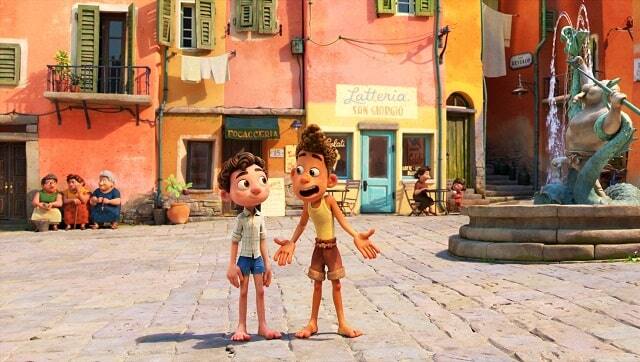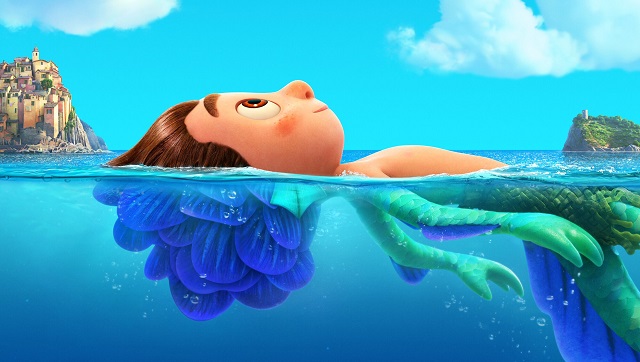The Viewfinder is a fortnightly column by writer and critic Rahul Desai, that looks at films through a personal lens. * It’s the 1950s, and a meek young sea monster lives off the Italian coast with his parents. He is forbidden from swimming to the surface; the humans hunt his kind. But then he meets a vibrant fellow sea monster, who introduces him to the oddities of humankind. Together, the two unlikely friends leave the water, sneak into the town and embark upon a warm coming-of-age journey. In many ways, Luca, the new Pixar movie, is the most significant child of the pandemic baby boom. On the face of it, the premise has nothing to do with Covid-19. But the design is a latent consequence of it. The film wears the ruse of a tender slice-of-life dramedy, but its composition is uncanny. For instance, little Luca and his watery home symbolise the language of lockdown: the creatures are defined by their fear of what they cannot see. The air looks intimidating. The location is a nod to the devastating western debut of the virus: Italy’s healthcare collapse in 2020 was after all a warning bell to the rest of the planet. The central rule of Luca – that the sea monsters morph into human versions of themselves when dry – evokes the freedom of breaking quarantine. Early on, Alberto teaches Luca how to walk and blend into the idyllic environment – a cute riff on how so many of us have had to relearn the most fundamental aspects of existence. Even the film’s human-creature conflict, steeped in the exaggerations of urban legend and deep-rooted racism, is an animated allegory for the European migrant crisis – a hark back to a pre-Covid universe, when illegal immigration was treated as nothing less than a cultural epidemic. (It’s no coincidence that water – the medium of countless capsized tragedies – is supposed to seal the fate of the misunderstood monsters.) Several scenes feature the two friends looking wondrously at the sky and their surroundings. Luca is keen to study the solar system and stars. Their childlike gaze is a reminder of the beguiling world – the reward – that we have been battling to experience again. Then there are the disarming stakes of Luca: a celebration of the simple pleasures of life. For example, the main ambition of Luca and Alberto – the driving force of this story – is to buy a Vespa and travel the globe. The Portorosso Cup Race, the town’s annual event, is a triathlon fittingly featuring three ‘skills’ that summon the glory of the great outdoors: swimming, biking and pasta-eating. Giulia, the little girl who shelters the two misfits, is the kind of summer-vacation friend most kids dream of making: she teaches them the ways of civilisation, guards their secrets and inspires them to challenge the age-old prejudices of the fishing town. Even Luca’s loving parents – who spend much of the film desperately seeking their son by wetting the skin of perplexed children – become the quirky embodiment of a vaccination drive. The cathartic metaphors aside, Luca also reveals a more primal narrative of nostalgia. The film preaches harmony in its happily ever after – with the two sea monsters winning the race, humbling the cocky villain and broadening the hearts of the hesitant townsfolk. But it’s the equation between Luca and Alberta that really struck a chord with me. Their arc reflects a bittersweet truth. In the end, scrappy Alberto sells off the prize Vespa so that Luca can afford a good school in a better place. So that Luca can grow the way he deserves to. Given the title of the film, the mild protagonist is the one whose big-city future is enabled by a necessary relationship. Even Alberto earns his evolution curve – he gets adopted by Giulia’s working-class father, he finds a family and an identity. But the lasting impression is that of Alberto staying back in the pond while Luca, our bright hero, goes forth to conquer the vast ocean. The end credits show Luca in Genoa, dazzling humans with his monster magic and studying astronomy with future wife Giulia.
Which is to say: The boyish buddy flick of Luca and Alberto eventually sacrifices itself at the altar of adulthood. Their friendship is not a place but a time.
[caption id=“attachment_9789201” align=“alignnone” width=“640”]  Luca and Alberto in the village. Image via Youtube[/caption] While growing up in a small city, I aspired to be a Luca. I was shy, cautious and risk-averse. My parents weren’t strict, but I felt deeply protected. If carefree classmates splashed around in a puddle, I stood in a corner and smiled. If they planned a prank on a teacher, I opted out for the fear of being caught and punished. As a result, the few friends I had automatically assumed the role of an Alberto in my life. And I needed them to. They became the ones who nudged me, little by little, out of my cozy shell – out of the cold water and into the vast infinity of sun-drenched landscapes and limitless possibility. They helped me dream of Vespas, triathlons, humanity and stars. I was the hero of my story, the timid creature propelled by the energy of breezy souls. As it turned out, I was one of the first teenagers to leave my hometown for a big city. In my head, this was perhaps what my friends had prepared me for. The spirited ones had taught me to jog forward, even as I felt like I was leaving them behind. Maybe that was their role – to help me fly, to be the wind beneath my stiff wings. I never looked back. I made new friends in the big city. Mumbai became my Genoa. It took me a while to adjust, but the adrenaline of discovering a different sky kept me going. Every morning promised multiple evenings. I settled down, keen to extend the movie beyond its end credits. But it wasn’t long before something dawned on me. Most people I met had also outgrown their childhoods to come here. The culture shock made all of us – creatures of habit – go wide-eyed together. Most of them, too, thrived on social acceptance and integration. The locals in turn were fascinated by the authentic colour and texture (skins) of their personalities. In short, I wasn’t the only Luca anymore. A thousand adventures collided and jostled for space. I wondered if they all had an Alberto behind their leap. And I wondered if they could relate to their Alberto any longer. As the years passed, however, a running joke took shape. Every time I found my comfort zone, it morphed into a memory. Every close friend I made had the tendency to move on – from the big city to a big country. One left for Boston, another for Dubai, another for Chicago, another for London. And I remained in Mumbai, stranded in the slipstream of soaring flights. Just like that, the roles had reversed: I was now a passing phase in other lives. Most of us are so busy aiming to be a lavish Luca that we end up becoming an Alberto along the way. The self-pity set in: Was it me? If so, what was it about me that spurred dreamers on to treat Mumbai as more of a milestone than a destination? But when they visited, we would frolic around town and retread those bygone summers. They spoke in my tone, and asked me questions about the place they left instead of speaking of the space they adopted. They had been away – and on the move – for so long that, from their viewpoint, my static figure was the one in constant motion. Over time, I learnt that it was only a matter of perspective. Let’s say the film was called Alberto – we then get the story of a drifter locating his roots with a little help from his friends. The town may as well be another planet for him once he finds a sense of belonging. I also learnt that the enabler of one story could be the protagonist of another. Even the demise of romantic relationships invokes the illusion that one partner is left behind while the other takes off; that one is a restless Luca, while the other is an altruistic Alberto. Yet, it’s not so much humankind that is divided into these two distinct characters as humans themselves who can incubate both these roles at once.
The pandemic has only cemented this duality. Staying feels like leaving and leaving feels like staying.
The same friends who moved away like Luca have also struggled to confront the implications of feeling ‘left behind’ on returning to their hometowns like Alberto. I’ve been left behind like Alberto, but also found myself navigating the newness of a big city like Luca. In the process, friendships have been both reduced and elevated to places – while shedding the parameters of time. Most importantly, living has become the currency of surviving, and breathing the expression of hoping: everyone is at once a fish out of water and a human renewing the perception of land. We are not people in a film anymore, we are the whole film. The Alberto within each of us still wants to build a Vespa for the Luca shackled inside us. But not to travel the world. To maybe take a leisurely ride around the neighbourhood and reacquaint ourselves with the simple pleasures: the stars, the wind, the streets and the humans who see monsters in the mirror. After all, home is where the art is. Read more from ‘The Viewfinder’ series here .


)
)
)
)
)
)
)
)
)



